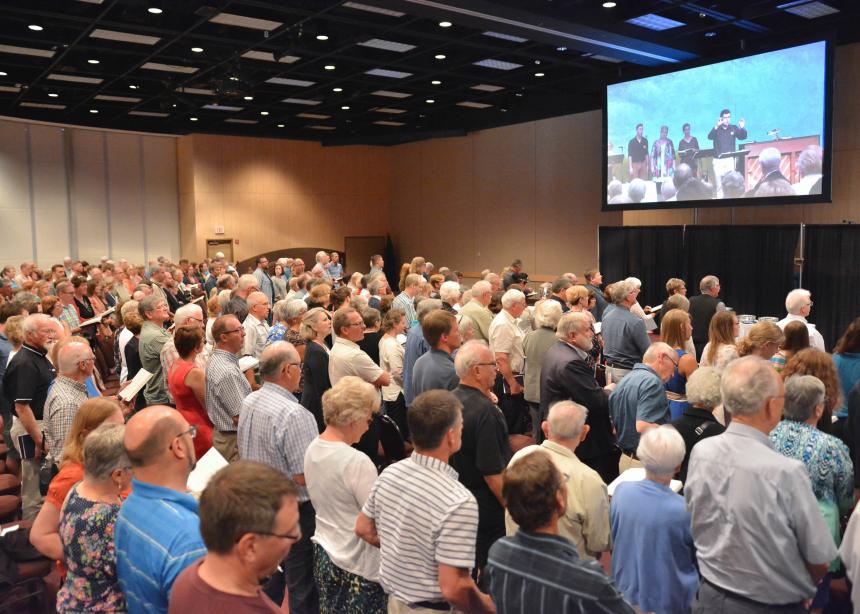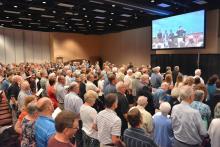I’ve run into a number of people who are “spiritual but not religious,” who have recently started attending church. They told me they skip the opening worship and just show up to hear the message. When I asked why, one person said, “The music doesn’t resonate with me or the world I live in. It often hinders my ability to connect with God, to be honest.”
“It’s mostly the language,” another said. “The words get in the way. The instrumental music is fine, but the lyrics often distract or trigger me. The lyrics make it difficult to be fully present.”
Another said, “It doesn’t feel authentic. I have a good BS meter, and the music often comes across as kind of fake.”
When I asked them to describe meaningful “worship,” they all said essentially the same thing: “Creating space for authentic connection with Divine Spirit.”
I’ve asked many church members to describe “good” or “meaningful” worship, and most of them fall into one of three categories:
1. Feelers
Good worship means getting the “feelies.” For some, that means feeling joy, excitement, celebration and passion. For others, it means feeling peace, mystery and the blissful spaciousness of silent unknowing.
2. Thinkers
A good worship service means the songs and sermons are thoughtful and theologically sound or intellectually stimulating.
3. Sensors
Good worship engages the physical senses. Worship happens best through physical movement (dancing, a meditative walk, running, gardening, etc.), or multi-sensory experiences (light shining through stained glass, aroma of incense, tasting bread and wine).
We all worship in different ways because we’re all different. Genuine worship honours the uniqueness of individuals but it also confronts our individualism. It both affirms who we are and transforms who we are.
Our worship fails to transform us when we’re just going through the motions or when our primary focus is on what worship does for us. Too often our worship is about inducing a certain intellectual or emotional state rather than deepening an actual relationship with God. There is nothing wrong with desiring good feelings and intellectual stimulation in worship; God wants us to experience joy and peace and intellectual rejuvenation. The problem is, we are prone to become addicted to these intellectual and emotional states. We turn worship into getting our fix. We do not worship because we love God, we worship because we love the feeling or intellectual invigoration or certainty that worship brings.
The Bible teaches us that worship is first and foremost about loving God. Worship is always an act of love. The Bible also teaches that genuine worship involves our whole beings. Worship isn’t a compartmentalized activity that only engages one’s heart or mind or body. It engages every part of us, every dynamic of our beings.
Genuine worship begins when one’s mind, heart, body and soul come into alignment within oneself as we allow our full selves to experience God’s love intellectually, emotionally, physically, psychologically and spiritually. Then worship becomes our full response to God’s love. As Apostle John declares: “We love because God first loved us.” Worship ultimately results in greater unity with God and others but it first unites individuals within their personal beings.
Jesus says we must worship “in spirit and in truth.” Worshipping in truth requires a complete and courageous commitment to truth. The truth of the world we live in, the truth of who we are and the truth of who we sense God calling us to become. M. Scott Peck describes this as “a life of continuous and never-ending stringent self-examination . . . and a willingness to be personally challenged.” Worship spends less energy on affirming the truth we already “know” and more on opening ourselves up to the truth God is revealing in this moment that often challenges, transforms and liberates us.
Worshipping in spirit is rooted in awareness of the interconnectedness between our spirits (the centre of our beings) and Divine Spirit. It begins with recognizing God is Present (I Am). Worship is consciously tending to the presence of God who is present with us and within us.
When we come together to collectively recognize and respond to God’s presence in our midst, something happens that we don’t experience on our own. When we come together to love God with our whole beings, as a response to God’s love for us, we experience a oneness with God and one another that is beyond understanding and is profoundly transforming. True worship is one of the most beautiful, vulnerable and powerful experiences humans can share together.
And I believe that it’s the kind of worship “spiritual but not religious” people are seeking.
Troy Watson is pastor of Avon Mennonite Church, Stratford, Ont.
Read more Life in the Postmodern Shift columns by Troy Watson:
Sharing life with your tribe
The clarity of divine call
'What's next, God?'




Add new comment
Canadian Mennonite invites comments and encourages constructive discussion about our content. Actual full names (first and last) are required. Comments are moderated and may be edited. They will not appear online until approved and will be posted during business hours. Some comments may be reproduced in print.